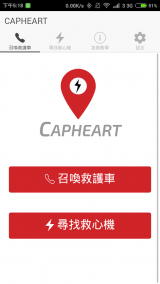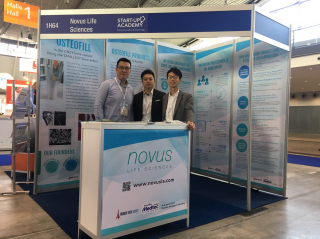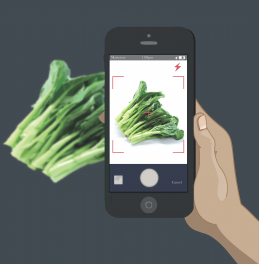Media
HKU DreamCatchers 100K Entrepreneurship winning projects
New material for treating animal osteoarthritis, AED locator and fresh food recognition and nutrition information apps
28 May 2017
Three winning projects in the DreamCatchers 100K Entrepreneurship seed fund competition held by the University of Hong Kong this year provided innovative solution for applications including a mobile app to provide information on locations of AED (automatic external defibrillators) for emergency sudden cardiac arrest situations; a new bone substitute for treating osteoarthritis in animals; and a mobile app which can recognise fresh food and vegetables and provide nutritious information to users.
The final pitch of the competition was held on April 2. A total of 104 teams formed by over 300 HKU students and young alumni participated in the event, among them 20 teams entered the final pitch. Ten winning teams were selected, each was given a seed fund of HK$100,000 to develop their business plans.
Details of the three winning projects:
Capheart
There are 3,000 deaths due to sudden cardiac arrested (SCA) in Hong Kong each year. When patients are suffered from SCA, their survival rate will drop by 10% per min. However, the 12-min. standard service pledge of ambulances arrivals is too long for them to wait. Capheart is the first mobile app developed in Hong Kong to rescue SCA patients through automatic external defibrillators (AED) location services, before the arrivals of ambulances. Using Capheart, the SCA patients' family, friends or even bystanders, can locate and pick up the nearest AED immediately for rescue.
The team is now developing the second phase of the app to connect all qualified first-aiders, paramedics, doctors and nurses with SOS requestors, and implement an emergency rescue network in Hong Kong and other cities.
Novus
Since 2014, the Novus team has been developing a new bone substitute which has clear edge as a potential therapy for bone damage in animals and humans. The substitute can be applied in a variety of bone-related surgical procedures and will soon be tested in animal total hip replacement. It is expected to be ready for human use in 2019/20. The new material also has potential application in treating other orthopaedics problems including vertebroplasty and maxillofacial surgery.
Osteoarthritis in animals is just as common as that in humans. Recent research indicates that osteoarthritis is the result of a viscous cycle initiated by damage to bone underneath the cartilage. By filling those damaged areas and accompanying subchondral cysts with the bone substitute, the progression of the disease may hopefully be stopped. The new bone substitute is well-suited for healing bone damage underneath the cartilage in animals. It can also be used as a bone cement to secure bone implants in place in animal complete joint replacement surgeries. Currently, it is very difficult for surgeons to fixate bone implants due to the small size of animal bones. The major bone cements in the market Calcium Phosphate and PMMA are too viscous to be injected through a needle of such a small gauge size. Novus’s product has a lower viscosity which can fit the purpose. The team’s next step is to develop a new cartilage substitute that can be used in conjunction with the bone substitute so as to provide a comprehensive treatment for orthopaedic diseases. They hope the new cartilage substitute can be made available to the animal market in 2018/19, before further development for clinical use in humans.
Marketeer
Sixty percent of food sales in Hong Kong are fresh products sold unpacked, without any kind of nutrition label or information provided. This is at times when health and nutrition concerns are on the rise more than ever before. Marketeer, a mobile app that recognises the fresh food sold in Hong Kong's markets and traditional shops, provides the solution. With a single snap of the camera, the user can get all the information needed to know in the clearest and simplest manner - all according to the user’s own health conditions, body type, and nutritional goals.
The innovator of Marketeer is a non-local student in Hong Kong, who wants to enjoy the amazing array of fresh cheap food sold in Hong Kong's public markets, while finding the communication barrier a real struggle on every visit. The team utilised Artificial Intelligence with Machine Learning capabilities for recognition of a wide variety of food. Visual Recognising is one of the hottest topics in today's tech world. The team can manage to achieve a level of accuracy in recognition and match the results with their own nutrition algorithm ranking the item according to the user's profile.
For information of all the ten winning projects, please visit: http://www.hku.hk/press/news_detail_16365.html
Media enquiry
Technology Transfer Office Mr Taurus Yip (Tel: 3917 1743/ 9359 4229; Email: taurus.yip@hku.hk)
Technology Transfer Office Mr Laurence Tang (Tel: 3917 1714/ 6076 9413; Email: laurence.tang@hku.hk)



